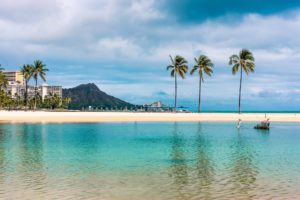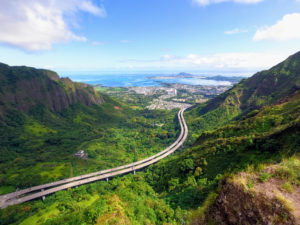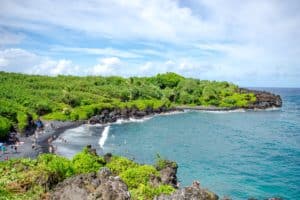Moving to Hawaii may indeed sound like a fantasy for many, and buying a home in Hawaii is the stuff dreams are made of.
But it doesn’t have to just be a fantasy, and there there are even some affordable homes in Hawaii, if you know where to look.
While it may seem like a dream or fantasy to some, there are certainly practical things to keep in mind before moving to the islands.
Most importantly is the place, followed by price. You’ll want to find a place you can call home and a community you can feel a part of. For example, if you don’t like windy, rainy weather, the northside of most islands may not be the best fit for you.
Place
If you’ve never lived in Hawaii before, moving to the main island of Oahu is probably the best place to start. As the most populated island that’s home to the cosmopolitan city of Honolulu, the most job opportunities and access to mainland comforts can be found here. You’ll, of course, want to do a little research on the Hawaii housing market to see what your options may be. Deciding where to live is essential when trying to map out opportunities for Hawaii real estate or property investment. Also: what island? Oahu is the most populated, but Maui is second, with a more tourism-driven industry and a couple wineries. The Big Island is far more remote, with a very local vibe and less industry, while Kauai is a chicken-covered “Garden Isle” with lush green scenery that feels more remote than some of the more tourism-driven islands, while keeping you in touch with civilization. Unless you’re working for Larry Ellison or a pineapple plantation, moving to Lanai may be a far shot, but never say never!
Price
Ah, “the price of paradise”: It’s no secret that Hawaii real estate isn’t cheap … and Hawaii property tax is also something you can’t shy away from. You may ask: why is housing so expensive in Hawaii? Well, who wouldn’t want to live here? As Hawaii is quite expensive, you’ll need to spend time researching affordable Hawaii housing options. Scope out property management companies on Oahu and in Honolulu before jumping in, as well as consult a Hawaii real estate agent, who can help you find the best options for your budget and price range. For some, renting, while more expensive, may be a good way to start before you delve into a long-term commitment. Housing isn’t the only thing that is more expensive than the mainland: Gas and food can also cause sticker-shock. Consider investing in a Costco membership to buy in bulk and save money on essentials.
Purpose
Most importantly of all, you have to consider your why. Why are you moving to Hawaii? Malihini, the Hawaiian term for newcomers, come and go from the islands to the mainland quite frequently, and thus, have earned a negative reputation for being uber transient and uninvested. Many locals are wary of newcomers. You have to consider that this may affect getting a job, house hunting, and even your potential social circles. If you’re lucky enough to have snagged a fully remote job and want to enjoy the weather, keep in mind that your salary may not go as far on the islands, and that the time difference may pose potential deadline problems, depending on how rigid your working hours are.
Potential
Do you wish to buy or rent? Almost half of Hawaii residents rent, and 600-square-feet spots retail for about 1,000 a month. Keep this in mind, and be prepared to pay up to $3,000 a month for something larger and more homey. Depending on your timeline, and if you want to make a home in the islands, it may be wise to rent when you first arrive, to get a first-hand feel for the neighborhood, before making a longer-term commitment. That said, if you can spare the time, travel to the islands before you move to scope out potential, longer-term dwellings, as well as make sure you are making the right decision before you move. Living in Hawaii is far different than vacating there, so if you have the luxury of testing out the islands for a longer period (and staying in a local neighborhood via Airbnb rather than a hotel), you will have a better feel for the vibe of what it’s actually like to live there. Many first-comers to Oahu start off in Waikiki, because it’s what they know, but being in the heart of touristville can certainly have its cons, if you want to convince the locals that you’re looking for something more long-term.
Partnerships
Networking can be the best way to assure you’re here to stay, as well as connect yourselves with people who are willing to help your Hawaii home and property investment. Pair yourself with a professional Hawaii local realtor who can help you make a wise, informed decision before making the plunge and buying a new place. A home realtor can help on how to buy real estate in Hawaii.
Practicality / Pets & Keiki
Be pragmatic when considering what to bring from the mainland. Storage and shipping can be quite expensive, and while many people do bring their cars over on a boat, this is not necessarily the most cost-friendly option, although many people do save money by shipping their cars.
And of course, you’ll want to keep any kids or critters you have in mind. Lots of children in Hawaii go to private schools, but scope out the reputation of the school district in your potential property area before making the plunge. Sad but true: Some local neighborhoods can be quite dangerous and bully-bound for kids who aren’t local.
As for pets, some species, such as bengal cats, which thrive on the mainland, are prohibited in Hawaii, as they are known to threaten a rare island bird species. Many animals also have to undergo a quarantine period before entering the islands. Be sure you do your research on needed health requirements or possible ways to evade the quarantine period for your furry friend–and if you can bring them in cargo or coach.
Living in Hawaii comes with pros and cons, just like anywhere. But we certainly think that the beautiful scenery and welcoming spirit of aloha outweigh the negatives and make Hawaii a wonderful place to call home. The hashtag #luckywelivehawaii isn’t trending among kamaaina (locals) for nothing.








